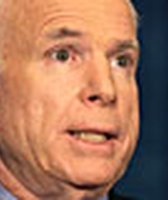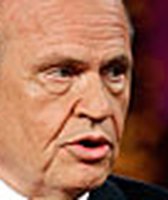Stand up for the facts!
Our only agenda is to publish the truth so you can be an informed participant in democracy.
We need your help.
I would like to contribute
SUMMARY: Sen. John McCain is known as the war candidate because he supports having U.S. troops in Iraq, but he wants voters to remember that supporting the war is not the same as agreeing with the White House.
McCain, a Vietnam War hero, has been one of the biggest supporters of President Bush's war policy.
He's also been one of its biggest critics.
Throughout his struggling campaign for president, McCain has been the war candidate, eager to defend the decision to invade Iraq and the need to keep U.S. troops there.
Now, as he tries to revive his campaign, he is putting new emphasis on his old criticisms of the Bush administration's war strategy in hopes of distancing himself from a widely unpopular president prosecuting a widely unpopular war.
Last week, McCain's campaign launched a TV advertisement in New Hampshire that points out that McCain, unlike his rivals for the Republican nomination, has long opposed Bush's handling of the war. "One man opposed a flawed strategy in Iraq," the announcer in the ad says. "One man had the courage to call for change. One man didn't play politics with the truth."
And the claim is true. Just months after the initial invasion in March 2003, McCain began calling for more troops and money for Iraqi reconstruction. He criticized Defense Secretary Donald Rumsfeld as far back as 2004, blaming him for creating conditions that allowed the insurgency to flourish and for failing to plan appropriately for what might happen after the invasion.
"There was a gross misunderstatement of the challenge we faced in the postconflict aspect of Iraq," he told National Public Radio on Dec. 6, 2005. "If the president wants (Rumsfeld) on his team, I'm not going to question that. But, as I said — very strong disagreements because early on after the initial military phase, I said, 'You've got to have more troops over there.' … And we paid a very heavy price for that."
But his backing of the overall U.S. mission in Iraq has made it difficult for McCain to differentiate himself from the president, pollsters say. It also has helped tarnish his most prized political asset, the maverick reputation that won him the New Hampshire primary in 2000.
Despite his four years of dour critiques and warnings about flawed strategies, McCain has — like Bush — offered four years of optimistic predictions, insisting that political and military success in Iraq were nigh. In April 2007, McCain insisted many neighborhoods in Baghdad were safe, then walked through a city market — under the protection of 100 U.S. soldiers, while wearing an armored vest.
Rather than a foil to the White House, he has been seen as an aide.
"Six months ago, Republican voters felt that he was in lockstep with the president (on the war), and … he was just going off the edge of the cliff for the president," said Dick Bennett, president of the New Hampshire-based American Research Group.
Bennett and others say the perception seems to be changing, however, thanks to a robust effort by the McCain campaign to re-establish his credentials as an independent thinker, particularly on the war, that focuses on a simple theme: I told you so.
In addition to three new TV and radio ads, McCain has been campaigning with former CIA director R. James Woolsey, former Reagan national security adviser Robert McFarlane, fellow Vietnam veterans and others who stress McCain's backing for the war and his opposition to Bush policies.
McCain's campaign recently created an interactive time-line for his Web site showing his statements on the war as he made them, from 2003 to the present.
"The attacks he's getting — that he's with Bush on this — he's saying well I am, but I'm not," said Jennifer Duffy, editor of the nonpartisan Cook Political Report. "In a sense, he's trying to split the baby."
Few senators have done more than McCain to protect the administration's right to maintain the current course in Iraq and to wage war as the president sees fit.
Two weeks ago, as the Senate debated a series of measures aimed at curtailing the president's policy in Iraq, McCain was a fixture on the Senate floor, speaking fervently against any effort to set a timeline for withdrawing U.S. troops.
He also helped the Senate kill a publicly popular bill that would have forced the Pentagon to give troops the same amount of rest time back home as they spent in Iraq before they could be sent to Iraq again.
McCain argued that the measure would usurp the president's power as commander in chief to set rotation schedules, and that it was a back-door attempt to force Bush to cut troops, which it was.
"We are succeeding and we are winning. And with the enactment of this amendment, we will choose to lose. This is setting a formula for surrender, not for victory," McCain, the senior Republican on the Armed Services Committee, argued on the Senate floor Sept. 19, 2007.
"I am hearing from the troops in the field three words, three words: Let us win."
McCain, a former Navy pilot, spent nearly six years as a prisoner of war in Vietnam after his plane was shot down. In 20 years in the Senate, he has become a leader on military issues and foreign affairs, and he argues that he has the experience needed to lead the nation in a dangerous world. McCain has enjoyed his own surge recently, particularly in New Hampshire, where the latest poll by the Survey Center at the University of New Hampshire shows him gaining 5 points, though he's still well behind leaders Rudy Giuliani and Mitt Romney.
Andy Smith, a political scientist and director of the center, said it's hard to tell if McCain's new emphasis on his differences with Bush over the war is a big factor.
It's probably more helpful that the debate over immigration reform has cooled, he said. McCain backed a bill to give illegal immigrants a route to legal status, something many in the Republican base abhor.
Still, McCain may benefit from the way the public debate on Iraq is evolving, with even top Democratic candidates now acknowledging that U.S. troops are likely to be in Iraq for years to come. Romney also has been criticizing past strategy in Iraq while continuing to support the war.
McCain is "actually in a nice position, because he's got himself on record talking about putting more troops in early on," Smith said. "It's like a soft, 'I told you so, but I still have to do what's right for the team.'"
Our Sources
Interview Oct. 2, 2007, with Jennifer Duffy, editor, the Cook Political Report.
Interview Oct. 2, 2007, with Andy Smith, director, The Survey Center, University of New Hampshire.
Interview Oct. 2, 2007, with Dick Bennett, president, American Research Group Inc. of Manchester, N.H.
Council on Foreign Relations, John McCain speech , April 22, 2004
Meet the Press, interview with John McCain , Nov. 21, 2004
Fox News Sunday, interview with John McCain , Aug. 14, 2005.
American Enterprise Institute, panel discussion with John McCain , Jan. 5, 2007
NBC Nightly News, story on McCain's walk in a Baghdad market, April 1, 2007.
U.S. Senate Floor debate , Sept. 19, 2007
CNN/WMUR New Hampshire poll , Sept. 26, 2007
Meet the Press, interview with John McCain , Aug. 24, 2003
Council on Foreign Relations, John McCain speech , Nov. 5, 2003



































